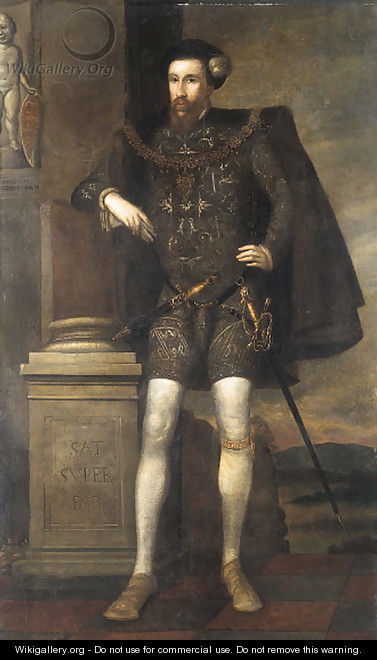Howard Family
Sola Virtus Invicta (Only Virtue Unconquered)
Chapter 12 : Disaster at Boulogne
A year later, Surrey was back as Lieutenant General of the King on Sea and Land for all the English possessions in France – Calais and its Pale and Boulogne, a position of great prestige. His immediate task was to fortify Boulogne and enable it to be used as a safe haven for armies arriving from England to deliver Henry's vision of the re-conquest of France.

Like his father and grandfather, Surrey was an active and vigorous soldier, but disinclined to listen to orders from the Privy Council, concerned about the cost of the war. Continuing financial crises at home led to many of the troops not being paid, and a paucity of supplies. There were rumblings of discontent among the men.
The only people keen on the continued defence of Boulogne were Surrey and King Henry himself. Everyone else thought it a waste of men and money and begged the King to give it up. Surrey's father, Norfolk, wrote to him, advising him not to
"animate..the king too much for the keeping of Boulogne, for who so doth, at length shall get small thanks."
Norfolk and Surrey were increasingly at loggerheads over the best course to take, the father lamenting that his son ignored his advice and instructions.Norfolk apparently said that he would rather see Surrey and all his children buried, than consent to the ruin of the realm.
Surrey, the bit between his teeth, refused to listen, and began to behave in a more arrogant and self-confident fashion than was at all advisable: commissioning grandiose portraits, and, most foolish of all, looking into a redrawing of his coat of arms.
Coats of arms were important status symbols, and their design and use was closely controlled by the College of Arms. Surrey decided to quarter his arms with those associated with the County of Anjou (the patrimony of Henry II) and Edward the Confessor. As a descendant of Edward I, the rules, did, in theory permit this. The question of whether it was politic to display the King's arms is another matter altogether.
Eventually, matters in Boulogne reached a crisis point. The French army marched on the town, and Surrey led his force out against them, perhaps taking reckless risks. Initially, it looked as though the English might be victorious, but the tide of battle turned and Surrey and his men retreated with heavy losses.
In accordance with normal practice, Surrey wrote to the King and Council, explaining what had happened but, for whatever reason, his letters were delayed until other reports had reached the King. Suspicious that Surrey was hiding the truth, several stiff letters arrived. He was removed from overall command within the month, and replaced with his arch-rival, Edward Seymour, Earl of Hertford, fresh from slaughter in Scotland.
In March of 1546, Surrey was recalled to London, but not granted audience with the King.
